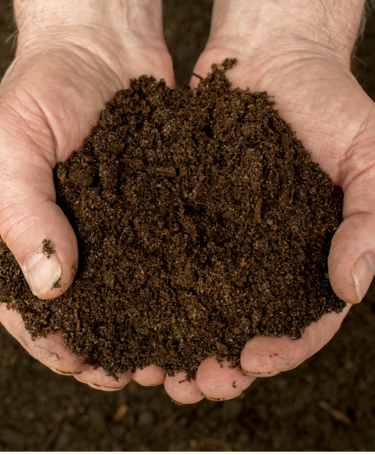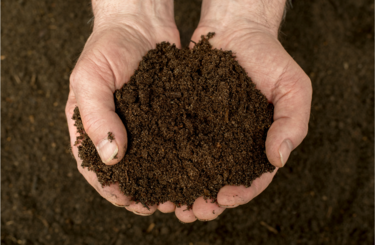
Compost standards at the heart of sustainability

From keen gardeners to large-scale farmers, compost is a vital component in maintaining soil health and promoting growth. With UKAS having recently awarded the first accreditations under Renewable Energy Assurance Ltd’s (REAL) Compost Certification Scheme, REAL’s Emma Laws explains why quality standards in compost are so important.
Composting may not be the trendy face of recycling, but its importance is undeniable, both in improving soil quality for agriculture and horticulture and in reducing waste. Given that compost often starts with food waste and ends in food production, its quality must be monitored closely throughout the production cycle.
In 2007, the Business Resource Efficiency and Waste (BREW) Programme, the Waste & Resources Action Programme (WRAP) and the Environment Agency (EA), in consultation with other stakeholders, launched a Quality Protocol for the production and use of quality compost from source-segregated biowaste, now referred to as the Compost Quality Protocol. It gives assurance to everyone from gardeners to major agricultural producers that quality compost is being produced, using processes that are safe for human, animal and plant health.
Renewable Energy Assurance Ltd (REAL), which was founded to carry out certification and consumer protection activities, and to promote renewable energy and a circular economy, developed the Compost Certification Scheme (CCS).
The CCS provides a framework for the independent assessment and certification of compost, meaning any compost that bears the CCS conformity mark is quality assured, as well as having ‘end-of-waste’ status. The scheme is available for compost that is mainly used in farming and gardening.
Quality compost, a certified safe and good quality product, is important because the composted materials are predominantly being spread to land, so can have an impact on the health of plants, animals and humans.
In April, three certification bodies completed a 12-month pilot assessment programme and were granted UKAS accreditation against both the CCS and the standard ISO/IEC 17065:2012 Conformity assessment – Requirements for bodies certifying products, processes and service.
“One of the aims of the CCS is to ensure market confidence in the material we are certifying,” explains Emma Laws, Research and Communications Officer at REAL. “UKAS accreditation brings greater assurance and confidence in the assessment process and therefore in the quality of the material that we certify. The UKAS mark is well recognised and respected, it brings greater credence to certification.
“Previously, it was a requirement by REAL for our certification bodies to be working to the principles of ISO/IEC 17065. It has always been REAL’s aim to get UKAS accreditation, because it is a real achievement, showing quality and standards, which is obviously what we are all about.”
The importance of quality in compost
Not only does compost produce a higher crop yield – something of increasing importance in the face of a growing global population and food shortages – it can reduce the need for chemical fertilisers. It also helps by improving water retention in soil, increasing plant growth and reducing harmful run-offs, and it assists in revitalising soil that has been contaminated by hazardous waste.
“Soil is a really important ecosystem. There are more organisms in a teaspoon of soil than there are people on the planet, so it is really important that we maintain soil health in this country,” Laws says.
“Quality compost, a certified safe and good quality product, is important because the composted materials are predominantly being spread to land, so can have an impact on the health of plants, animals and humans. A lot of the compost being produced on our scheme goes to agriculture, so it can have a real impact in that way. Quality compost is important for health and safety, but also for increasing the organic matter in soil, as well as soil’s ability to retain water and nutrients.
“The different sites on our schemes process different feedstocks, ranging from garden waste – what goes into your garden waste bin at home for kerbside collections – food waste, also from kerbside collections, as well as catering waste, paper and cardboard, untreated wood and compostable packaging. Some people will process excess from growing crops on their farm; they will compost that so it goes back to the land.
“It is a real range, and it is processed in different ways depending on the input material. Food waste will generally be dealt with by in-vessel composting, which is as it sounds – in a contained area. That generally gets a bit hotter and is a faster process. Green waste, for example your garden waste, will be composted in open-air turned windrows – long lines of piled-up compost you may see in the countryside.”
Quality standards
So how are quality standards measured in compost?
“There are three different things that we certify against,” Laws says. “PAS 100, which is the recognised standard, sets out the parameters that you have to be tested against with specified upper limits. For example, sending samples to a lab and how much of a certain element can be in that sample before it fails. There has to be a quality management system and a hazard analysis and critical control point (HACCP) system in place. It also sets out how often you have to sample, depending on the batch size.
“You also have to meet the Compost Quality Protocol (or SEPA RPS in Scotland), which is the document that sets out how you go from waste to product. It outlines what input material you are allowed, with a list of acceptable waste codes, setting out what an input could be. It also details those markets you are allowed to sell into, because compost can only go to certain markets.
“We also have our own scheme rules, so if compost is PAS 100 certified by us, it meets our rules. These set out how the scheme operates, our involvement, our database and the information we collect, and the rules on using our mark.”
“The PAS 100 certification mark that we use – there is one for England, Wales and Northern Ireland, and another one for Scotland, because there are slightly different regulations –means that compost has been independently verified and assessed against a recognised standard. It means it has achieved end of waste status, so is completely safe for use as a product and has been fully tested; the CCS requirements set out limits including on things such as plastic content and potentially toxic elements. It basically means safety and quality, which is what we are all striving for.”
Find out more about Renewable Energy Assurance Limited's work.